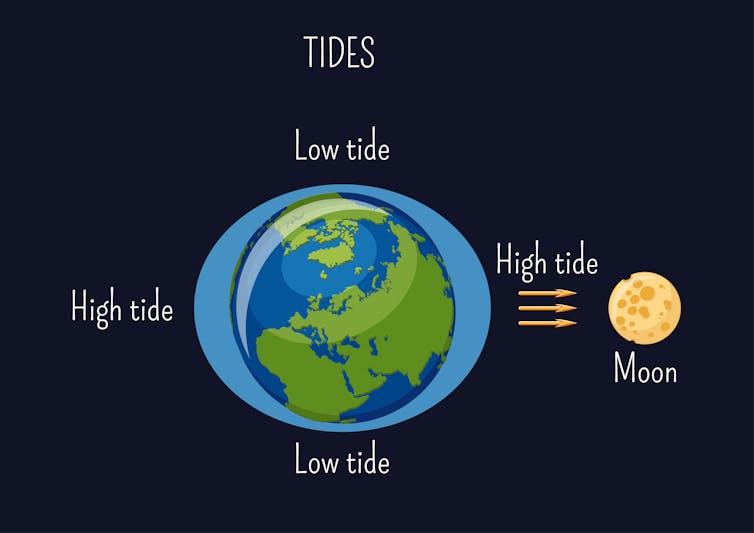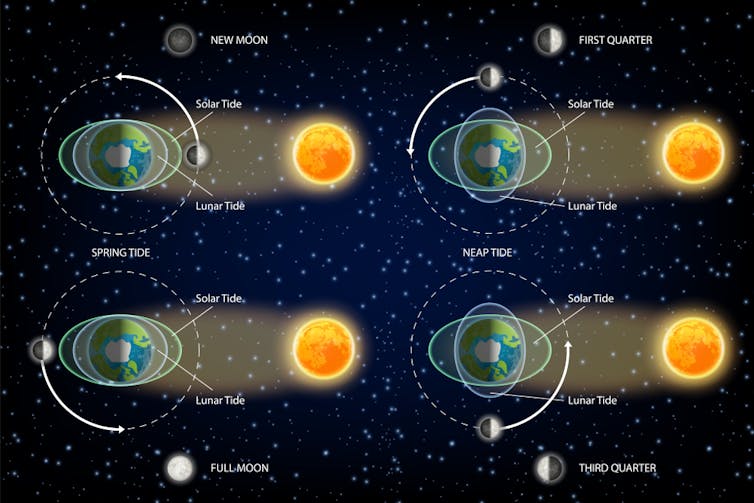How does the Moon, being so far away, affect the tides on Earth?
- Written by Mark Hemer, Senior Research Scientist, Oceans and Atmosphere, CSIRO
This is an article from Curious Kids, a series for children. You can send your question to curiouskids@theconversation.edu.au. You might also like the podcast Imagine This, a co-production between ABC KIDS listen and The Conversation, based on Curious Kids.
How does the Moon, being so far away, affect the tides on Earth? – Lachie, age 8, Doreen, Melbourne.
Great question Lachie!
The short answer is that the Moon’s gravity pulls the oceans (and us) towards it. Even though the Moon is so far away, it is large enough that its force of gravity is strong enough to do that.
But before we get into how the Moon affects tides, let’s look at what tides are.
Tides are the rise and fall of water level in the oceans (and lakes, and even in your cup of water, but they’re very small).
When the sea level rises to its highest point, we call that high tide. When it falls to its lowest point, that’s called low tide.
The rise and fall of the tides is known as the tide cycle. If there’s one high tide and one low tide a day, like you would see if you went on holiday to Perth, it’s called a diurnal tide cycle. If there are two high tides and two low tides, like you see in Victoria, it’s called a semi-diurnal tide cycle.
The Moon has the most effect on the tides, but it’s not the only factor that affects them. The Sun and the Earth can also affect the tides. We’ll start with the Moon.
Read more: Curious Kids: Are there living things on different galaxies?
Tides and the Moon
The Moon affects the tides because of gravity. You will have noticed that every time you jump, you always land back on the ground. This is because the Earth’s gravity is pulling you back down.
 The Earth’s spinning means that another high tide occurs on the opposite side of the Earth to the Moon.
Shutterstock
The Earth’s spinning means that another high tide occurs on the opposite side of the Earth to the Moon.
Shutterstock
The Moon has gravity of its own, which pulls the oceans (and us) towards it. The Moon’s gravitational pull on us is much weaker than Earth’s, so we don’t really notice it, but we can see the Moon’s effect on the liquid water of the oceans. The oceans are pulled towards the Moon’s gravity slightly, causing a bulge or high tide on the side of the Earth closest to the Moon.
The Earth’s effect
If the Moon causes a high tide on one side of the Earth, what causes the high tide on the other side?
The Earth is spinning, which is why we have night and day. The Earth’s spinning means that another high tide occurs on the opposite side of the Earth to the Moon.
These two high tides draw water away from the rest of the oceans, causing two low tides between the high tides.
Why do we have tides? - Forces of Nature with Brian Cox: Episode 2 - BBC One.The Sun
The Sun, just like the Moon and the Earth, also has its own gravity which can affect the tides. Although the Sun is much larger than the Moon and has more gravity, it’s also much further away, meaning its pull on the tides is less than half as strong as the Moon’s.
It still does have an effect, though. When the Sun and Moon are in line with the Earth (when a full moon or new moon occur), their combined gravity cause very high tides (and very low tides), known as “spring tides.”
When the Sun and Moon are at right angles to each other (during a waxing or waning moon), the Sun helps to cancel out the pull of gravity from the Moon, causing lower high tides and higher than average low tides, known as “neap tides”.
 Lunar and Solar tides diagram.
Shutterstock
Lunar and Solar tides diagram.
Shutterstock
So the Moon affects the tides because of gravity, but gravity from the Sun and the spinning of the Earth also change how the tides behave.
Best wishes,
Mark Hemer.
Read more: Curious Kids: Is there anything hotter than the Sun?
Hello, curious kids! Have you got a question you’d like an expert to answer? Ask an adult to send your question to us. You can:
* Email your question to curiouskids@theconversation.edu.au * Tell us on Twitter by tagging @ConversationEDU with the hashtag #curiouskids, or * Tell us on Facebook
 CC BY-ND
Please tell us your name, age and which city you live in. You can send an audio recording of your question too, if you want. Send as many questions as you like! We won’t be able to answer every question but we will do our best.
CC BY-ND
Please tell us your name, age and which city you live in. You can send an audio recording of your question too, if you want. Send as many questions as you like! We won’t be able to answer every question but we will do our best.
Authors: Mark Hemer, Senior Research Scientist, Oceans and Atmosphere, CSIRO





